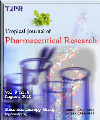
|
Tropical Journal of Pharmaceutical Research
Pharmacotherapy Group, Faculty of Pharmacy, University of Benin, Benin City, Nigeria
ISSN: 1596-5996
EISSN: 1596-5996
Vol. 16, No. 1, 2017, pp. 109-118
|
 Bioline Code: pr17014
Bioline Code: pr17014
Full paper language: English
Document type: Research Article
Document available free of charge
|
|
|
Tropical Journal of Pharmaceutical Research, Vol. 16, No. 1, 2017, pp. 109-118
| en |
Inhibitory effect of Taraxacum officinale  L (Compositae) aqueous root extract on spermatogenesis L (Compositae) aqueous root extract on spermatogenesis
Tahtamouni, Lubna H; Abdellatif, Reem N; Khateeb, Rema A Al-; Mazaydeh, Zainab A Al-; Yasin, Salem R; Gharabli, Samer I Al- & Elkarmi, Ali Z
Abstract
Purpose: To investigate if T. officinale root aqueous extract has anti-spermatogenic activity similar to
that of the whole plant which was shown previously to inhibit spermatogenesis.
Methods: T. officinale aqueous extract was prepared by soaking 100 g of dried materials in 1 L distilled
water for two days at 45 oC. Fifty adult male rats were divided into five groups and treated for 60 days.
Four groups were gavaged with the whole plant or root aqueous extract in low or high doses. The male
rat rats were allowed to mate with female rats. The control group received distilled water. Sperm count,
motility and morphology as well as chromatin integrity were evaluated.
Results: Serum testosterone level, sperm parameters, pregnancy rate and average number of fetuses
per pregnant females decreased significantly in the treated groups compared to control and in the root-receiving
rats compared to the whole plant-receiving rats. Female rats which were mated with high dose
root-receiving males did not deliver fetuses. Cross sections of seminiferous tubules of T. officinale-treated
rats showed lesions and disorganized germinal epithelium. Late spermatogenesis maturation
arrest (spermatid stage) was observed in all of the treated groups except the high dose root-receiving
group which showed early maturation arrest (spermatocyte stage). In addition, the mRNA level of two
spermatogonial stem cell markers responsible for self-renewal and proliferation of spermatogonia
increased in high dose-receiving rats.
Conclusion: T. officinale root aqueous extract has inhibitory effects on spermatogenesis. Further
studies are required to identify specific ingredient(s) in T. officinale that may be useful as male
contraceptive(s).
Keywords
Taraxacum officinale; Dandelion; GDNF family receptor alpha 1; Macrophage Colony-Stimulating Factor; Promyelocytic Leukaemia Zinc-Finger; Testosterone; Sperm count
|
| |
© Copyright 2017 - Pharmacotherapy Group, Faculty of Pharmacy, University of Benin, Benin City, 300001 Nigeria.
Alternative site location: http://www.tjpr.org
|
|
